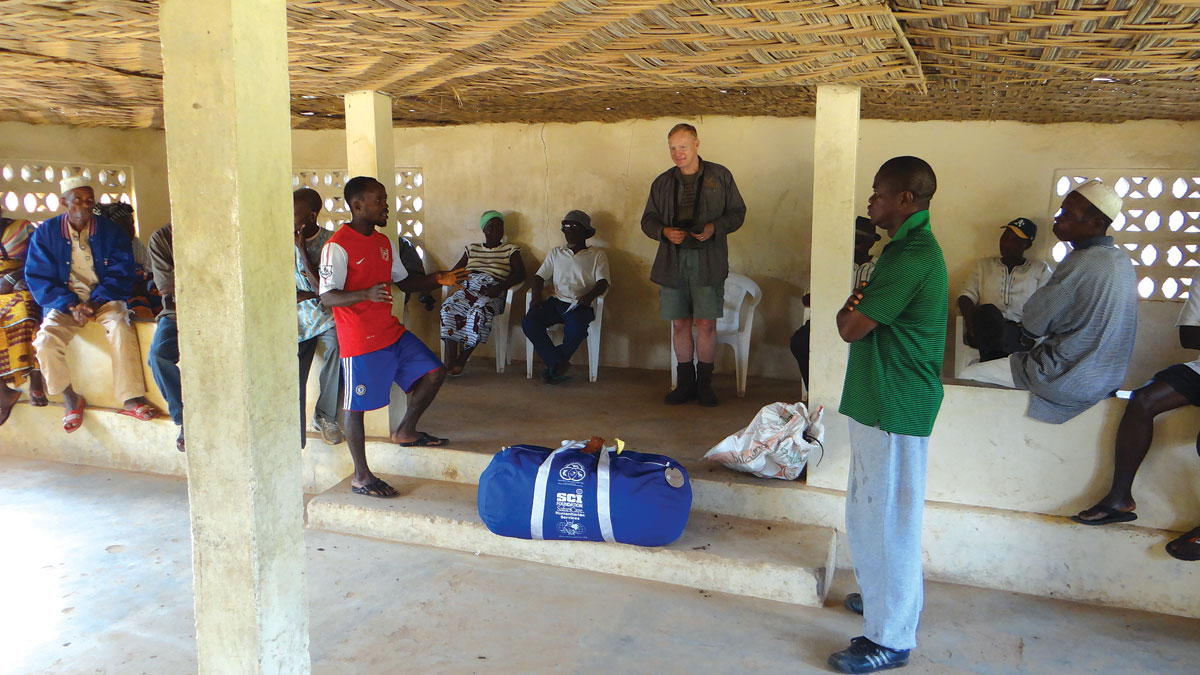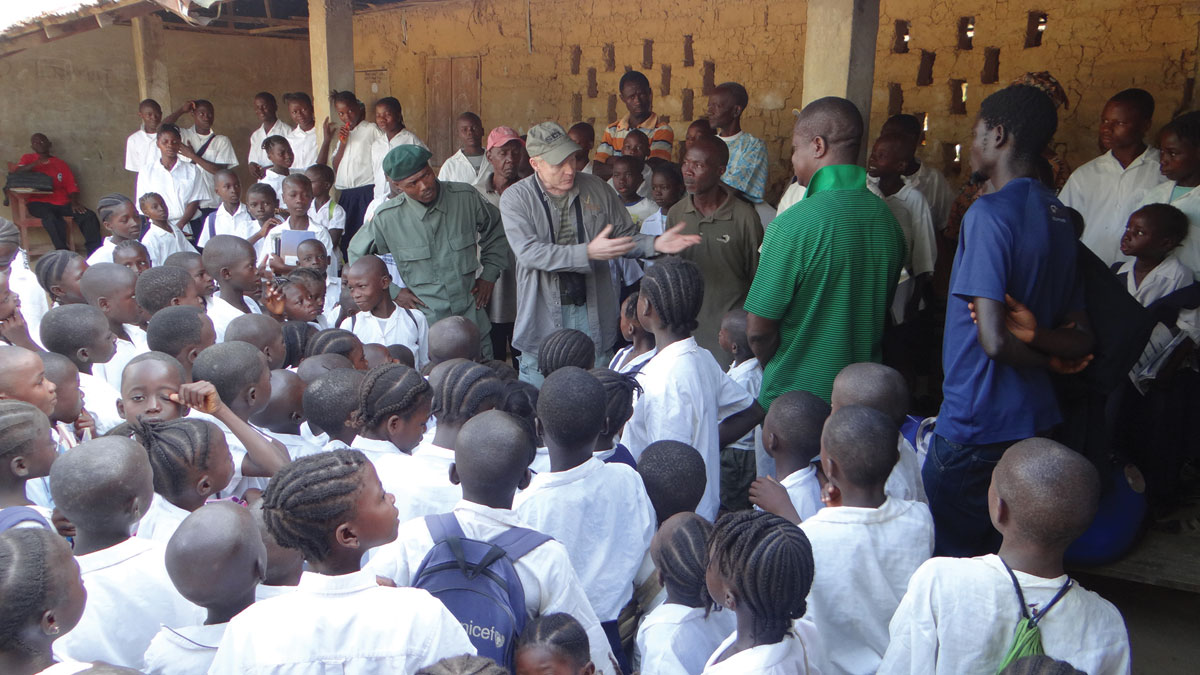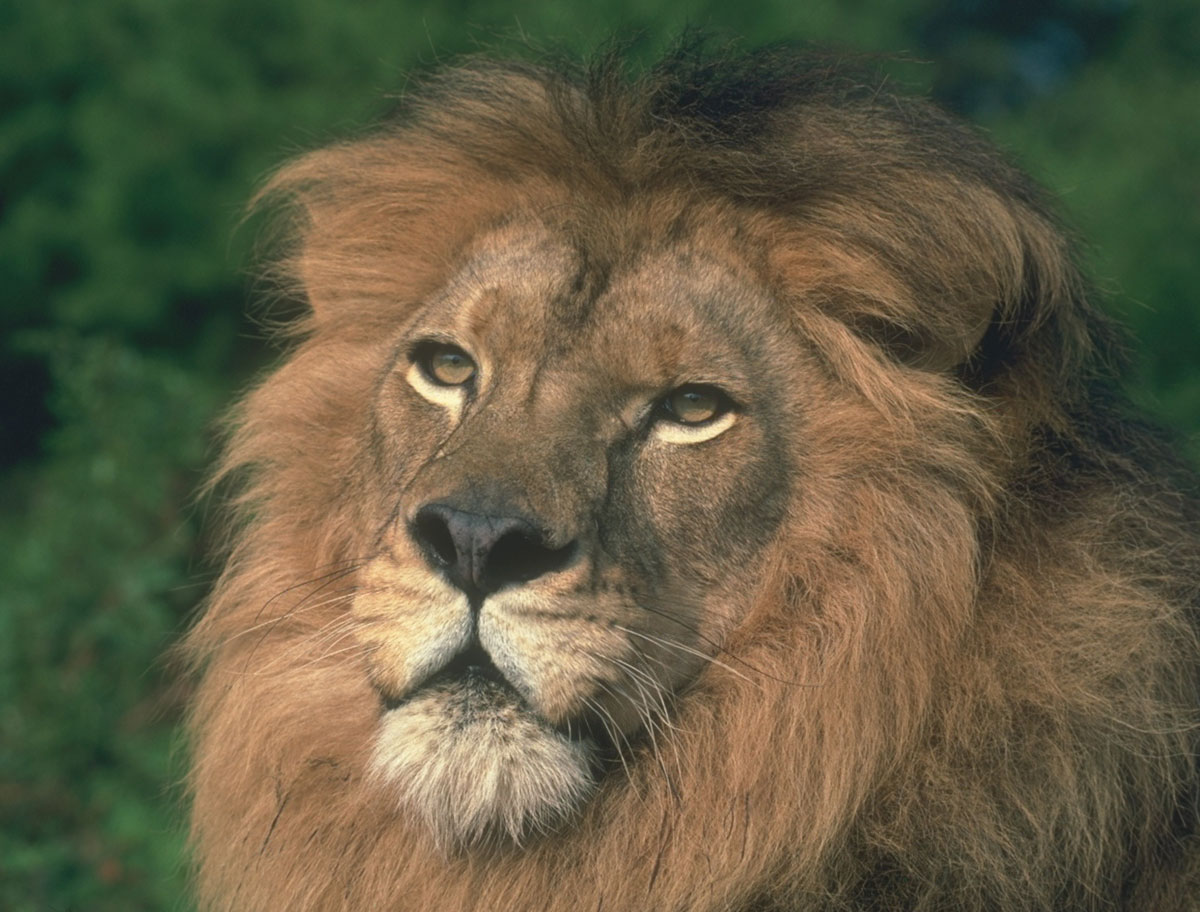A Blue Bag To Liberia
Tennessee Valley Chapter‚Äôs fundraiser. I guess they figured I had enough plaques to put on the wall, so they gave me a Blue Bag, pre-loaded with school supplies, toys, candy, T-shirts, toothbrushes, all kinds of good stuff–about 70 pounds of good stuff!
 The Blue Bag, a gift from Tennessee Valley Chapter, was first presented to the village elders in Zuie, northwestern Liberia, and then taken to the school for distribution.[/caption]
The Blue Bag, a gift from Tennessee Valley Chapter, was first presented to the village elders in Zuie, northwestern Liberia, and then taken to the school for distribution.[/caption]
I was about halfway through my Liberian hunt when we took the Blue Bag to the school in Zuie, a major town on the western bank of the Mana River in western Liberia. By that time I had the lay of the land. Before the civil war, there was a bridge over the Mana River, but now there is no bridge. There is also no power, no running water, no roads, no vehicles…well, that list could go on, but there is a school packed with beautiful children in spotless school uniforms, and a staff of teachers doing the best they can with absolutely nothing.
Safari hunting is new to Zuie, brought in by Morris Dougba of Liberia Rain Forest Safaris. Well, come to think of it, any white faces are fairly unusual in Zuie, but safari hunting has already brought dividends in local employment and sharing of meat. One of the first hunters in, Wilson Stout, pledged the hardware for a well, another basic installation Zuie doesn’t currently have. Thanks to our Tennessee Valley Chapter, the school received their Blue Bag—and they were extremely happy about it.
This is the third time Liberia has been open to sport hunting. Many of us will remember that founder C.J. McElroy and a small number of old-timers hunted there with Harry Gilmore in the 1970s, and that the country was open again briefly in the 1990s in an ill-fated venture headed up by Tom Banks. Right now the reopening is probably the most auspicious because actual government approval has been given, and there are now two safari operators. Steve Kobrine was first, starting in mid-2012 and operating in big forest in the southeast. Morris Dougba started in January 2013 and is hunting the opposite side of the country, toward Guinea and Sierra Leone.
On the western side of the country I found big country with very few people, in a forest that seems to hold a lot of game. The guides are simply local hunters; they know their forest and how to hunt it, but they’re meat hunters and our concept of selective trophy hunting is both brand new and difficult to grasp. To them meat is meat, and it will take time before they work out both how and where to hunt for the rarer prizes like zebra duiker rather than the common bay duiker—which, to them, have exactly the same value on the meat market. Historically, not everyone got zebra duiker, and that is certainly the case today. So far Kobrine has pulled in just one zebra duiker, Dougba none yet—but they’re there, and success will come along.
Beyond that legendary antelope there remains, as always, a good selection of forest game. Bongo have always been uncommon in Liberia, and I saw enough forest buffalo tracks to be hopeful, and there are both red river hogs and giant forest hogs around. Liberia is mostly a duiker hunt, with Maxwell’s, bay, and black duiker the most prevalent species. Water chevrotain are not uncommon, and although they are rare, all the forest hunters have encountered Jentink’s and yellow-back duiker.
The forest is always a difficult and challenging place to hunt, but Dougba had established a perfectly comfortable base camp and had good equipment, including three very sturdy slide-action shotguns. Interestingly, I also found this forest to be relatively “clean.” There are few snakes, few thorns and a whole lot fewer biting ants than I recall from several forest hunts in C.A.R. and Cameroon. In ten days, I saw exactly one mosquito. My hunting partner was Ralf Schneider, a very experienced forest hand, and we both commented on this, along with one other phenomenon that we cannot explain: As with all close-cover hunting you’re going to get scratches on your extremities. Under typical jungle/forest conditions even the smallest scratches turn septic immediately and take forever to heal. The scratches were unavoidably present—but there was little infection. It wasn’t an easy hunt, and I certainly didn’t find the game I hoped to find—but I’m convinced it’s there. I’ll just have to try again…and bring another Blue Bag.—Craig Boddington



